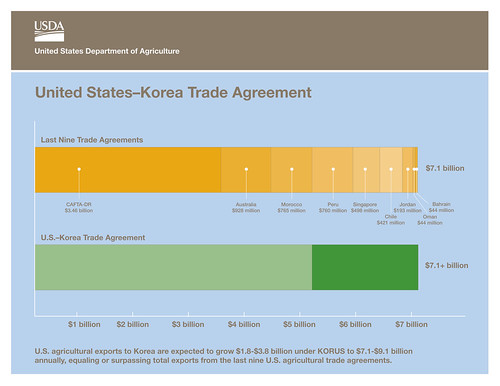
I spent yesterday in St. Louis, talking about the importance of trade and smart trade deals to America’s rebounding economy. Within 500 miles of St. Louis, farmers are producing more than three quarters of the nation’s corn and soybean crops, injecting $75 billion into the global economy, supporting 265,000 jobs, and producing $131 billion in crops and livestock. Meanwhile, the Mississippi River moves about 500 million tons of cargo each year, including 60 percent of the nation’s grain exports, accounting for $8.5 billion in exports. USDA recently reported that grain barge traffic around St. Louis is up 126 percent over last year, underscoring the importance of St. Louis to the national economy as a hub for U.S. farm exports. As the heart of the nation’s farm economy, St. Louis is pumping life into the overall economy.
Some of most pioneering agribusiness in the world also call St. Louis home and employ 20 percent of the bi-state area’s workforce. On-farm employment represents just one-tenth of all agriculture-related employment thanks to opportunities in research, education, food processing, and trade. These opportunities will only grow as the global population expands to 9 billion by 2050. And I want Americans, those in St. Louis and all over, to be the ones helping the world meet its growing demand for feed, fiber and fuel.
I stood next to a grain elevator on the Mississippi River and thought about the sheer volume of U.S .farm goods moving down that historic waterway, from Minneapolis to New Orleans and all points in between. This year, U.S. agricultural exports are forecast to shatter records and reach a record trade surplus of $47.5 billion. In short, that growth means jobs for Americans. In fact, U.S. farm exports will support more than 1.1 million jobs in 2011. But we can do better. And that’s where smart trade deals that increase exports, support job creation, and bolster the American economy come in. The U.S.-Korea Trade Agreement will do those things.
When ratified by Congress, this deal will eliminate tariffs on a variety of American goods – including grains and oilseeds, fruits and vegetables, and beef and pork – while adding tens of thousands of jobs to our economy. Economic output is estimated to grow more under U.S.-Korea agreement than from the United States’ last nine trade agreements combined.
Once the U.S.-Korea deal reaches Capitol Hill, we are asking Congress to ratify and implement it without delay. Failure to act could cost jobs now and in the future.



